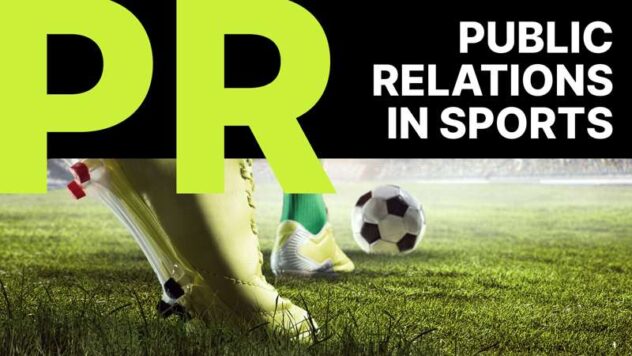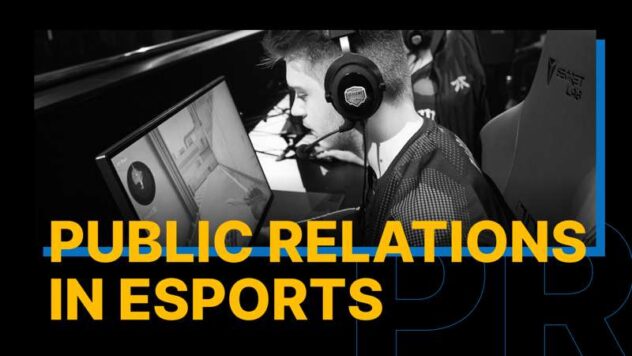PR in sport vs PR in esports – what’s the difference?
The entertainment industry as a whole (and most of the others as well) heavily relies on public relations. However, how to deal with multitudes of fans, haters, analysts and communicators cheering, reacting, and spreading the reach – and how to handle their feelings towards the brand they cheer for?

A brief definition of Public Relations (PR)
Probably, the most important asset of a successful company is its image. You have to please stakeholders, employees have to be proud of working in the company, the media outlets have to notice your business, and the public needs to have a good feeling about your brand. All of those tasks are connected within one department: Public relations.
There is a tendency of thinking that PR professionals have only one task: writing press releases. While it is a job of major importance, it’s not the bread-and-butter of a public relations representative; there’s much more to the place, such as conquering the media, telling stories, endomarketing (intern marketing), crisis management, publicity arranges, social media management… The department’s main business is to keep a positive image of the company in every single possible scenario.
While the Public Relations Society of America (PRSA) defines public relations as “public relations is a strategic communication process that builds mutually beneficial relationships between organizations and their publics”, there is so much more to talk about. Public relations firms have to analyse, anticipate, create, execute, integrate, and more. There are many objectives towards that “strategic communication process”, and many problems within the goals and some strategies.
The effort of public relations representatives can be the difference between a successful history and something to forget. Or even worse, something forgettable. And that’s true for many industries, but the impact of PR in the entertainment business is incredibly noticeable.
Sports PR and their importance in the sports industry

Traditional sports are one of the most important segments in the entertainment industry; sports fans are passionate, willing to do everything for the team their support. With so many emotions, the sports industry is a very difficult – and important – niche of work for public relations representatives.
Imagine when a team loses a championship that they’re heavy favourites. How to control the damage, the public’s perception about a failure? Sports PR experts need to deal with this kind of situation frequently. Damage control is key for sports teams, simply because only one can win at a time – I know this sounds obvious, but go tell that to the sports fans (or the sponsors, for instance!). Also, each victory is special, each conquest is eternal, and telling the path of greatness achieved by a sports team requires hard work, coherent efforts, and lots of planning.
Therefore, sports PR is much more than press releases or media relations; it’s about creating narratives over fantastic triumphs, and give the sports world some stories that will be forever inscribed in their annals. Strategizing over that is what defines the public relations work in the sports industry.
What are PR’s responsibilities?
PR teams will do content creation, media relations (such as press releases and pitch emails), some advertising strategies, reputation management, speech writing, social media management, events, internal communications, support in many fields of work, and finally, storytelling. Among other stuff that might appear, of course.
Successful sports organizations and how they do PR
Sports organizations can be huge, and sports public relations need to follow that greatness. PR firms working in this field need to know what they’re into when they accept this position: keeping public interest, sustain the images of professional athletes, and tie everything together. Dealing with passion is not a simple thing.
Social media came to help PR specialists to engage with the audience, and nowadays, it’s pretty impossible to imagine a huge sports team without an official page. Companies started to understand that advertising alone isn’t a good way to engage with the general public: thus, a good communication department became key in creating the bond between fans and the organization. That’s how we can summarize a well-made sports PR.
Another key interest of PR in sports is managing the athlete’s image potential, which can be key to their career. A good example is Cristiano Ronaldo’s image: we all know that he’s a very disciplined person, and his success as an athlete and within the media is very much due to how well he manages his image. You can be sure that there is a bunch of very good PR specialists dealing with that as well.
Talking about the teams and athletes that we love, connecting their stories, keeping them in the spotlight, managing their relations with the media, sponsors, other organizations, and the fans – this is what a powerful sports public relations team does to their clients.
Public relations and damage control
As mentioned before, some stories might not be sweet to tell. In the entertainment industry, dealing with pressure is among the most important abilities you should have if you’re thinking about find jobs in this sector. There are things that the target audience – fans, for instance – will never accept and understand, but reaching a common point between them and the organization (or athlete) reputation.
There are many ways to tell a negative story – and in sports, knowing them is essential. Not only for the passion of the fans, but even the athletes’ motivation is at stake: PR professionals need to choose the correct marketing tools, find the right words, to keep the relationships between everyone involved in a sports organization healthy. Or the most healthy as possible. PR is what will make the difference between a small-something and a life-changing misstep.
Discover more about esports: https://weplayholding.com/
PR in esports: overcoming the challenges

Electronic sports have, essentially, the very same challenges traditional sports bring to the table. However, due to the nature of competitive gaming, both audiences and athletes tend to be younger, socially active, and have quality demands. It’s a tough public that shares their attention between many things at the same time, and to keep esports relevant it’s needed a lot of creativity; from the design of an event to make it appear in the global media, PR departments work towards keeping the hype up.
How did the esports industry face COVID-19?
Different from traditional sports, esports can be played from anywhere in the world. While some events were held without the public presence, but in place, most of the competition was done in a “home office” fashion. This created many challenges for marketing teams, and PR teams were definitively a key for the success of this model; creating ever-lasting content, engaging with the audience, and making the media realize what they were doing.
Is the future of entertainment connected with public relations?
Definitely yes. Without the fear of sounding preposterous, managing the image of companies and individuals is key for the engagement (a very subtle way to mean profit) those entities bring.
Understanding the audience’s interests, for instance, can be game-defining when positioning a brand in such an industry. The importance of public relations is even more notable when we understand that every form of communication in this industry is a show, something that the fans will hold darling.
Entertainment is a very valuable asset to the media in general, but there’s tough competition inside it. Making your story shine is the main goal!
How to keep up the pace?
Entertainment is a very fast-paced industry: at least a bit because social media, information spreads fast, and PR professionals have to keep in mind that velocity. People can lose interest in a blink of an eye, and nothing hurts more (our feelings) than a good story lost in the sea of whatever.
PR specialists have the challenge of keeping the audience entertained, sure, but more than that they need to handle the pressure. Due to how fast communications are done today, the spectators are more demanding; they want to know specific details, their favourite athletes, their favourite organization’s daily routines, and much more. PR professionals need to have the creativity to be distinguished in this crowd; using that creativity to keep an ever-flow of engagement is especially hard. Embracing the chaos that is the crowd’s feeling with a planned, coherent communication strategy is the main goal of most PR departments.
Hitting the breaking news can be excellent or disastrous, depending on how the PR specialists can handle it. Sometimes the lines can be only mitigated, but even expressing success can be very hard for those ever-more demanding audiences. Specializations, courses, certifications, knowledge, knowledge, knowledge – those are important tools a PR professional needs to have to deal with this incredible segment.
Summarizing
To become a good PR professional in sports, esports, or the entertainment scene in general, you need a wide variety of skills: creativity, discipline, knowledge. Being passionate about it helps, but most importantly, working on the emotions and pressure management is key. Although there are differences between electronic and traditional sports (engaging audiences, for instance, can be very different), you’ll be dealing with people that will either love or hate your work – there’s no middle term. Expect a lot of engagements, an incredible reach (if everything goes well, especially), and many, many daily challenges that might come out of nowhere.
Discover more here: https://weplayholding.com/blog/


